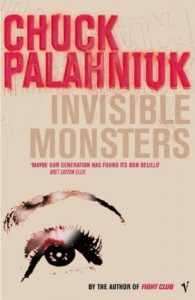Invisible Monsters
 I was very annoyed by this book from the very beginning. Palahniuk starts the narration with this jibe at his readers about how edgy his narrative style is going to be and that you're not going to like it and to just get over it, and the whole time I'm very much thinking, "You're trying too hard."
I was very annoyed by this book from the very beginning. Palahniuk starts the narration with this jibe at his readers about how edgy his narrative style is going to be and that you're not going to like it and to just get over it, and the whole time I'm very much thinking, "You're trying too hard."To make matters worse, in the middle of this novel I discovered that all Palahniuk novels are really the same thing in different dresses. To put it as he does in Invisible Monsters, his story has a million different combinations of facets, only three or four of which are great. Here's the formula in a nut-shell: Enter discouraged and alienated narrator, full of angst and despair about how contemporary American life is not fulfilling because it is too a) materialistic, b) conformist, c)superficial, d)pick-your-own hippie criticism of Americana. Narrator or protagonist then meets an iconoclastic, against-the-grain, in-your-face hero who subsequently shows the protagonist how wrong his life is and how to make it all better by a)joining a fight club, b)crashing cars into each other to find the meaning of life and time-travel, c)rob houses for drugs and get plastic surgery, d)purposely choke yourself in a restaurant to find real connections with people, e)pick-your-own-outlandish-extremist-behavior-that-no-sane-person-would-do.
This novel in particular felt more like Palahniuk was just trying to shock you by attacking a very uncomfortable subject in the form of gender identity, family acceptance, homosexuality and addiction/obsession (to beauty, drugs). And he makes very, very good points about the meaning of life (or it's lack thereof) and how we notice or fail to notice people doing their best to be noticed, loved, accepted. Maybe I've changed as a reader. Where once I found such observations fresh, intuitive and obvious-but-unnamed, more and more I find them crass, hypercynical or superficial the way people who get odd piercings think they're defying conventions of beauty to shove it to the rest of society but secretly hope to start fashion trends and followings of their own.
What I liked, and will always like about Chuck, is that he always manages to strike a perfect tone of bemused sarcasm in the way he takes ordinary observations about society and turns them into perfectly succinct truisms about the world that we would have never thought of ourselves. He weaves these through, sometimes repetitively, or with slight variations that evolve or tweak the thought throughout the narrative. In Invisible Monsters, Manus's similes about God are wonderfully adaptive, insightful, powerfully psychological and Freudian. The tortured and nonlinear narrative is also brilliantly fitting and masterful for the type of story he's trying to tell as well - plot supplemented by flashback supplemented by musing wherever appropriate. The short of it is, I like his writing style. I like his brain and the way it works. I like his philosophy, even if I don't always like the instruments he uses to reveal it.



